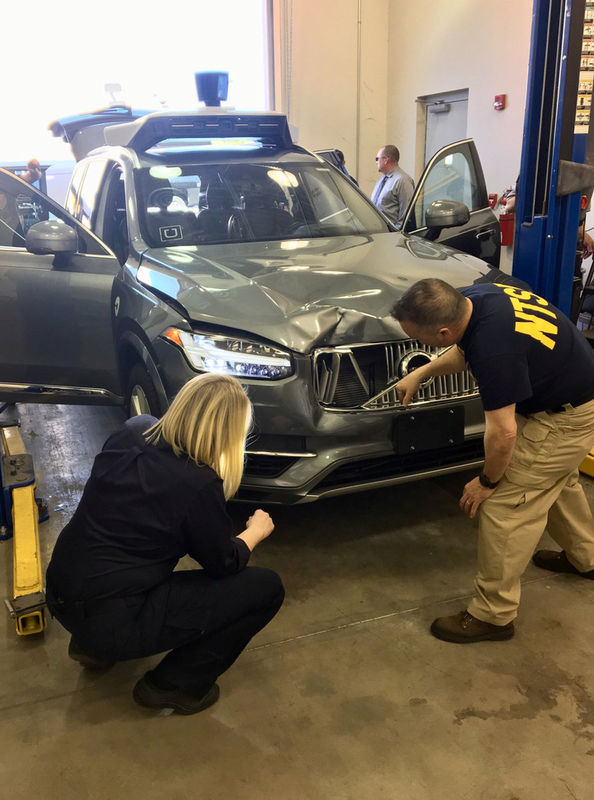This post was originally published on this site
https://i-invdn-com.akamaized.net/trkd-images/LYNXMPEFAI22N_L.jpg © Reuters. Handout photo of NTSB investigators examining a self-driving Uber vehicle involved in a fatal accident in Tempe
© Reuters. Handout photo of NTSB investigators examining a self-driving Uber vehicle involved in a fatal accident in TempeBy David Shepardson
WASHINGTON (Reuters) – The chairman of the U.S. National Transportation Safety Board (NTSB) on Tuesday criticized Uber Technologies Inc (N:) for its “ineffective safety culture” at the time of a March 2018 fatal self-driving car crash in Arizona.
NTSB Chairman Robert Sumwalt said “the inappropriate actions of both the automatic driving system as implemented and the vehicle’s human operator were symptoms of a deeper problem” citing the “ineffective safety culture that existed at the time of Uber.”
Recommendations the NTSB is making are likely to reverberate across the industry. The first-ever death attributed to a autonomous vehicle prompted significant safety concerns about the nascent self-driving car industry, which is working to get vehicles into commercial use.
The crash killed 49-year-old Elaine Herzberg as she was walking a bicycle across a street at night in Tempe, Arizona.
The NTSB previously disclosed the vehicle had significant software flaws, noting the software failed to properly identify her as a pedestrian and did not include a consideration for jaywalking pedestrians. Uber had also deactivated a Volvo automatic emergency braking system in the XC90 test vehicle it had modified.
The NTSB said on Tuesday it planned to identify the need for “safety risk management requirements for testing automated vehicles on public roads” signaling a broader question about how advanced vehicles are tested and U.S. government oversight.
In the aftermath of the crash, Uber suspended all testing and did not resume until December in Pennsylvania with revised software and significant new restrictions and safeguards.
A spokeswoman for Uber’s self-driving car effort, Sarah Abboud, did not comment immediately Tuesday but said earlier the company has “adopted critical program improvements to further prioritize safety.”
In March, prosecutors in Arizona said Uber was not criminally liable in the self-driving crash. Police have investigated whether the safety driver who was behind the wheel and supposed to respond in the event of an emergency should face criminal charges.
Police have said the crash was “entirely avoidable” and that the backup driver was watching “The Voice” TV program at the time of the crash.
The NTSB said Uber failed to adequately monitor backup safety drivers and lacked other significant safety rules.
Fusion Media or anyone involved with Fusion Media will not accept any liability for loss or damage as a result of reliance on the information including data, quotes, charts and buy/sell signals contained within this website. Please be fully informed regarding the risks and costs associated with trading the financial markets, it is one of the riskiest investment forms possible.

